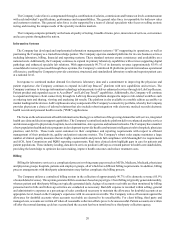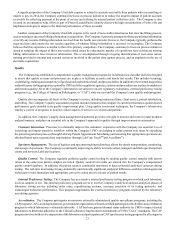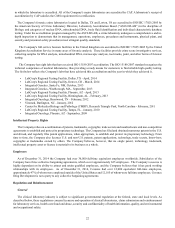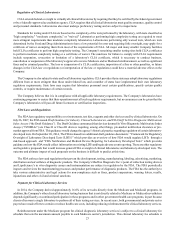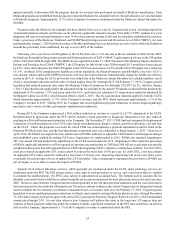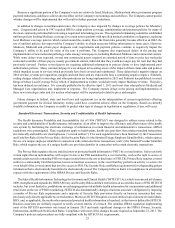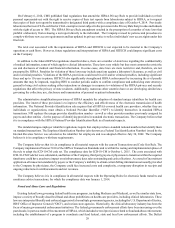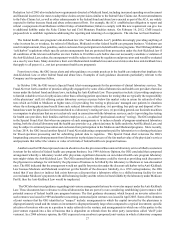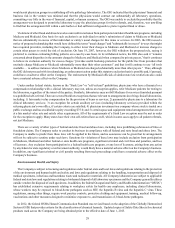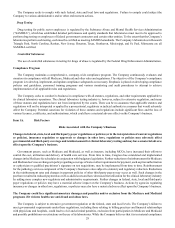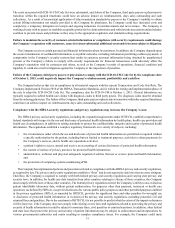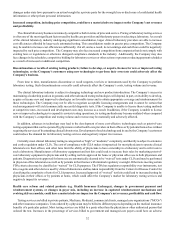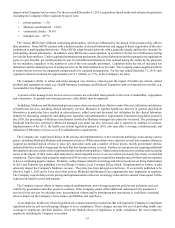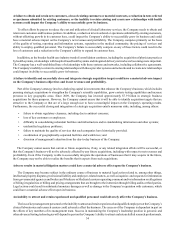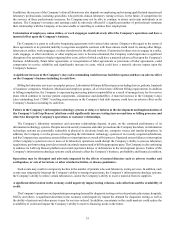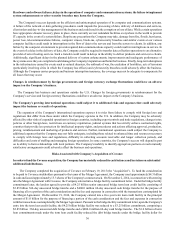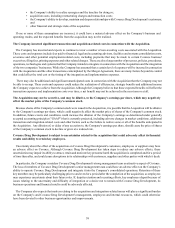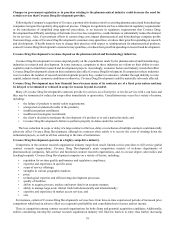LabCorp 2014 Annual Report Download - page 31
Download and view the complete annual report
Please find page 31 of the 2014 LabCorp annual report below. You can navigate through the pages in the report by either clicking on the pages listed below, or by using the keyword search tool below to find specific information within the annual report.29
The Company seeks to comply with such federal, state and local laws and regulations. Failure to comply could subject the
Company to various administrative and/or other enforcement actions.
Drug Testing
Drug testing for public sector employees is regulated by the Substance Abuse and Mental Health Services Administration
(“SAMHSA”), which has established detailed performance and quality standards that laboratories must meet to be approved to
perform drug testing on employees of federal government contractors and certain other entities. To the extent that the Company’s
laboratories perform such testing, each must be certified as meeting SAMHSA standards. The Company’s laboratories in Research
Triangle Park, North Carolina, Raritan, New Jersey, Houston, Texas, Southaven, Mississippi, and St. Paul, Minnesota are all
SAMHSA certified.
Controlled Substances
The use of controlled substances in testing for drugs of abuse is regulated by the Federal Drug Enforcement Administration.
Compliance Program
The Company maintains a comprehensive, company-wide compliance program. The Company continuously evaluates and
monitors its compliance with all Medicare, Medicaid and other rules and regulations. The objective of the Company’s compliance
program is to develop, implement, and update compliance safeguards as necessary. Emphasis is placed on developing compliance
policies and guidelines, personnel training programs and various monitoring and audit procedures to attempt to achieve
implementation of all applicable rules and regulations.
The Company seeks to conduct its business in compliance with all statutes, regulations, and other requirements applicable to
its clinical laboratory operations. The clinical laboratory testing industry is, however, subject to extensive regulation, and many
of these statutes and regulations have not been interpreted by the courts. There can be no assurance that applicable statutes and
regulations will not be interpreted or applied by a prosecutorial, regulatory or judicial authority in a manner that would adversely
affect the Company. Potential sanctions for violation of these statutes and regulations include significant fines and the loss of
various licenses, certificates, and authorizations, which could have a material adverse effect on the Company’s business.
Item 1A. Risk Factors
Risks Associated with the Company’s Business
Changes in federal, state, local and third-party payer regulations or policies (or in the interpretation of current regulations
or policies), insurance regulation or approvals or changes in other laws, regulations or policies may adversely affect
governmental and third-party coverage and reimbursement for clinical laboratory testing and may have a material adverse
effect upon the Company’s business.
Government payers, such as Medicare and Medicaid, as well as insurers, including MCOs, have increased their efforts to
control the cost, utilization and delivery of health care services. From time to time, Congress has considered and implemented
changes in the Medicare fee schedules in conjunction with budgetary legislation. Further reductions of reimbursement for Medicare
and Medicaid services or changes in policy regarding coverage of tests or other requirements for payment, such as prior authorization
or a physician or qualified practitioner’s signature on test requisitions, may be implemented from time to time. Reimbursement
for the pathology services component of the Company’s business is also subject to statutory and regulatory reduction. Reductions
in the reimbursement rates and changes in payment policies of other third-party payers may occur as well. Such changes in the
past have resulted in reduced payments as well as added costs and have decreased test utilization for the clinical laboratory industry
by adding more complex new regulatory and administrative requirements. Further changes in federal, state, local and third-party
payer regulations or policies may have a material adverse impact on the Company’s business. Actions by agencies regulating
insurance or changes in other laws, regulations, or policies may also have a material adverse effect upon the Company’s business.
The Company could face significant monetary damages and penalties and/or exclusion from the Medicare and Medicaid
programs if it violates health care anti-fraud and abuse laws.
The Company is subject to extensive government regulation at the federal, state and local levels. The Company’s failure to
meet governmental requirements under these regulations, including those relating to billing practices and financial relationships
with physicians and hospitals, could lead to civil and criminal penalties, exclusion from participation in Medicare and Medicaid
and possible prohibitions or restrictions on the use of its laboratories. While the Company believes that it is in material compliance



